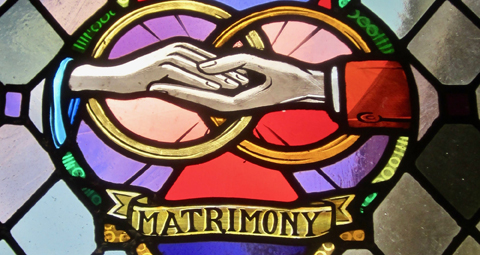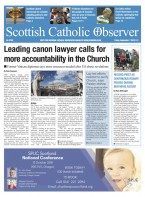September 7 | ![]() 0 COMMENTS
0 COMMENTS ![]() print
print

Church must reach out to those bruised by failed marriages and broken families
One lesson from the World Meeting of Families is that there is an urgent need for post-marriage care, says Fr Michael Kane
In recent years we have continued a tradition in St Ambrose High School of celebrating a ‘Mass of Welcome’ for our new S1 pupils. This is an opportunity to remind the new year group that they belong to a family of Faith at high school, and to encourage them to continue practicing that Faith. I also like to remind them of the most important place in the school building, the oratory, which is not simply there for decoration but to be used. I think most of them got the message although one boy did thank me afterwards for the ‘Massive Welcome.’ I didn’t correct him!
This Mass of Welcome came after a busy week in Dublin where I attended the World Meeting of Families alongside Bishop Joseph Toal of Motherwell Diocese.
The final days of the World Meeting were particularly joyful as Ireland enthusiastically welcomed Pope Francis to their land. His words of sorrow for the failings of some within the Church were especially welcome at a difficult time in Irish Church-state relations. His repeated plea for penance and forgiveness at the beginning of the open-air Mass in Phoenix Park received spontaneous applause from the congregation.
Those I met were moved by the Holy Father’s sincerity in atoning for the grievous sins of the Church. Hopefully his words and actions will contribute to the long and difficult process of healing.
The Festival of Families the night before at Croke Park struck an altogether different tone. This was a night of song and dance (and Riverdance!). It closed with an address from the Holy Father in which he called us to embrace small practical changes in our homes to strengthen family life.
His advice included making sure we end the day by forgiving any outstanding grudges in the home. He also called for a renewal of family prayer, especially teaching children how to bless themselves properly. He advocated the most important ‘family vocabulary,’ namely ‘please,’ ‘thank-you,’ and ‘sorry.’ The address was regularly drowned-out by the applause of a crowd receptive to these simple examples of love in the home.
Although the Pope’s two-day visit occupied the majority of the news bulletins, much of the focus in Dublin was on the three Congress days which we attended before the Holy Father’s arrival. As the leader of the Marriage and Family Life agency in our diocese, I was hoping to gain new insight on how we can better support families in our parishes through new diocesan initiatives. I found these three congress days in the RDS conference centre were especially fruitful.
The packed schedule of conferences and talks focused on practical ways to support families, in light of the Pope’s recent post-synodal Apostolic Exhortation Amoris Letitia.
There was a consistent call to greater pastoral sensitivity when accompanying families who have perhaps fallen short of the ideal of Christian family life as proposed by the Church.
Cardinal Christoph Schönborn of Vienna gave a powerful testimony of his own particular family background. With candid honesty he told the audience that he is the son of a broken marriage, and indeed that broken marriages surrounded him growing up; the marriage of his grandparents ended in divorce, and also those of his extended family.
He spoke passionately about the need for the Church to reach out to those who have been bruised and often-times broken by the experience of failed marriages; not only spouses but especially children who carry the often hidden wounds of growing-up in a broken home.
How do we communicate the Gospel of mercy to those who feel outside of the Church because their marriage has failed? How do we support children who carry the deep wounds of family breakdown?
Some of the most memorable conferences we attended were presented by lay leaders of marriage preparation courses who spoke with a united voice about the urgent need for more post-marriage care within the Church, sometimes known as marriage enrichment.
So much emphasis is placed rightly on the pre-marriage preparation, with so little follow-up when the problems and difficulties begin long after the vows have been spoken.
This was one of the most compelling messages from Dublin. Marriage and parenting requires real, concrete and practical accompaniment from the Church and yet few found that this need was being met in our parishes. It seems to me that this is a critical area of pastoral outreach which requires much more attention in the future. What more can we in the Church do to strengthen and sustain marriages and to equip them to withstand the inevitable hardships that come along?
It was also interesting to hear the experience of priests from around the world who are trying to support families, young couples, children and young adults in the modern world.
Most described it as a balancing act trying to uphold the noble ideals of the Church with a pastoral sensitivity that recognised the shifting sands of cotemporary values and the external influences that can damage family cohesion. Interestingly, the rise of modern communication and social media were cited time and time again as a potential danger in alienating parents from their children. So many families prefer to live in a digital world and grow further apart, even though they live physically under the same roof.
Other presenters expressed the opinion that many young people are not conversant with the Church’s fundamental teachings on love, sexuality and marriage. This poses a huge challenge if young people are not exposed to the Church’s wisdom, and the rich treasures of Gospel teaching. They run the risk of unknowingly constructing a family life which is seriously at odds with the values of our Faith.
Pope Francis has often spoken about the Church’s commission to support, accompany and listen to those within the family of the Church who feel unwelcomed and isolated as a result of their domestic situation.
He invites all of us priests to develop the heart of a gentle pastor who seeks to lighten the burden of those whom we serve, and to try as best we can to offer the embrace of the Church to those families living on the margins.
He invites all of us to engage sincerely in a listening exercise to hear the struggles and challenges of the families we serve, and to ensure they are all are made to feel welcome within the family of the Church. None of this can be achieved without the humility to listen and learn from each other.
In my life as a priest this speaks of the daily complexities of pastoral life. We are commissioned to teach and to preach the Catholic Faith in its entirety, in season and out of season. This is the essential vocation of a priest. We hold up the ideals of the Gospel, the ideals of family life as a precious gift for the world. Yet we know that our encounter is with people, and concrete lives and concrete histories, with all the complexities which that entails.
No-one ever approaches the Church with a blank canvas on which to begin the journey. We have all amassed baggage along the way. We all fall short of the ideals of the Gospel. And yet despite these obstacles and hurdles our families want to belong, and to be anchored to the Church.
Our work is to walk with people, to acknowledge difficulties and to try to heal the brokenness we find.
Of course, such a journey also requires honesty. Not every obstacle in a person’s moral life can be quickly overcome. Not every problem can be so quickly solved so that it fully chimes with the Gospel of Christ. Complex arrangements, such as the often quoted ‘divorced and remarried’ question cannot simply be swiftly resolved by admitting those in new unions to Sacramental Communion. Listening and accompanying is usually a long road; every challenge cannot simply be healed by a rush to the altar.
My days in Dublin left me with a sense that much more work has to be done in this area, so as not to isolate domestic families from the family of the Church. For many who feel they live uncomfortably on the fringes of our parishes the Church needs to reach out to them now more than ever with love, and, to steal an expression from a new first year pupil, to offer them a ‘massive welcome’ to the family of the Church.











